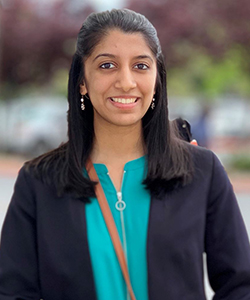Meet Visha Parmar

Degree: BS Biological Sciences ’20
Concentration: Organismal Biology/Physiology
Minor: Psychology
Research Interests: In the Elefant Lab, my research focus involves investigating the epigenetic role of HAT Tip60 in rescuing cognitive impairments in multiple neurodegenerative diseases, specifically Drosophila models of Alzheimer’s, Huntington’s, Parkinson’s, and ALS.
Extracurricular activities: Co-President, Beta Beta Beta Biological Honor Society; Lead Undergraduate Researcher, Elefant Lab; Member, Active Minds; Academic Associate, Emergency Department of Jefferson University Hospital; CareMate Volunteer, St. Mary Medical Center; Crocheter, St. Mary Medical Center Bee Comforted Program; Volunteer, YWCA Bucks County
Awards: Dean’s List, Honors with Distinction (in progress), A.J. Drexel Scholarship, the Pennsylvania Society Scholarship with the Maguire Foundation (four-time recipient)
Which element of your Drexel experience do you identify with most, and why?
I really identify with the “Ambition Can’t Wait” motto at Drexel because I always try to act on my goals and aspirations from the get-go to prepare myself for success. Knowing that I want to become a doctor, I have combined this ambition with the facilitative learning environment Drexel provides through its stellar faculty, diverse cohort group, advisers, seminars/workshops, and with CHOP, Penn, Jefferson, DUCOM, and Temple in close vicinity. This strong network has allowed me to go beyond the classroom starting freshman year and, through volunteering, shadowing, clinical research and tutoring, work towards my ambition. Bridging education with these hands-on experiences has been the core, most fulfilling element of my Drexel experience.
What motivates you?
Two things motivate me: curiosity and opportunities. I love to learn from people and my surroundings and become more aware about the world. From knowing why things are the way they are in life, to learning about things not covered by mainstream media, I find ways to broaden my knowledge about everything! In this way, I always try to take advantage of every opportunity I get to learn a new skillset, overcome a challenge, or gain perspective about a new or known topic. This drive stems from overcoming my obstacle of learning to speak fluent English when I came to America 12 years ago. From this experience, I learned to be grateful for every opportunity I receive, especially at Drexel, to become a stronger, well-rounded and adaptive individual.
Tell us about any research experiences you’ve had as a Drexel student.
I joined Dr. Elefant’s lab during the spring term of my freshman year. Receiving amazing mentorship from Mariah, Dr. Elefant and Priya has shaped me into a better scientist and critical thinker. My first project was to investigate the role of HAT Tip60 in rescuing cognitive impairments in the ALS Drosophila model, which I did during the summer of my freshman year and presented at the STAR Summer Showcase and the Stanford Research Conference. My interests in understanding multiple neurodegenerative diseases from the perspective of epigenetics led me to take part in a variety of projects in the lab involving dissections, confocal microscopy, PCR and behavioral assays. Figuring out the unknown, connecting it with what I learn in classrooms, and seeing how it can impact patient care in the future made me realize that I want to bridge research and medicine in my future career.
What were some of your most memorable travel experiences through Drexel?
This past year, I had the opportunity to present my research work at the 2019 Stanford Research Conference. Not only was this a goal that I was proud to achieve, but I finally got to explore the other side of the America, as I had only stayed and traveled on the East Coast! The conference was incredibly rewarding and inspiring — from learning what other undergraduates are researching across the country, to meeting lab members and seeing techniques in the world-renowned optogenetics lab.
What has made your experience at Drexel special or unique?
The faculty, especially in the biology department, has truly made my Drexel experience special. Everyone is so within reach, caring and available to meet at the earliest to discuss any concerns or plans. Every faculty member roots for your success and growth, and goes out of his or her way to help you achieve that goal. I am eternally grateful to have such an amazing support system from faculty members and advisers across different departments. Without them, I wouldn’t have been able to discover my potential and take on new endeavors to make the most of my Drexel experience.
What are your goals for after graduation? What do you hope to do with your Drexel degree?
I plan to pursue a career as a specialized physician and become a productive member of my community. I plan to attend medical school after graduation. With a Drexel degree, I have learned how to think critically, have an interdisciplinary approach to problem-solving, and tie everything back to what is happening in the real world. With all the skills, knowledge, advice and support system that I have been fortunate to gain, I am confident that Drexel has prepared me for a challenging yet incredibly rewarding career that strives to improve lives.